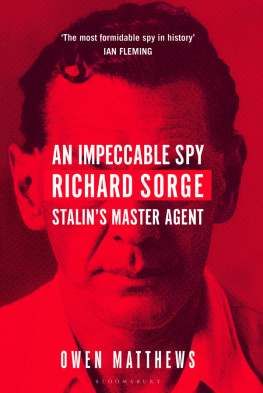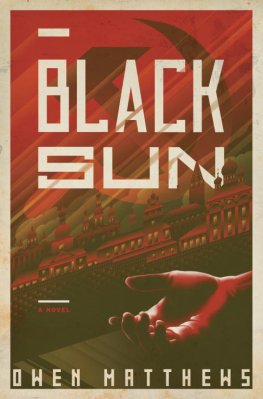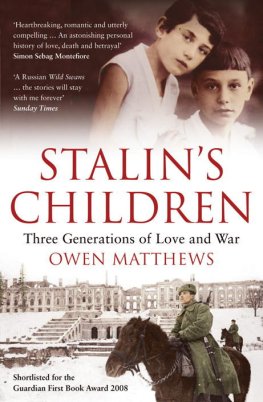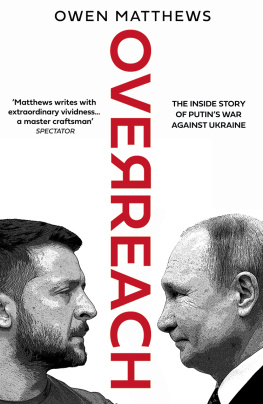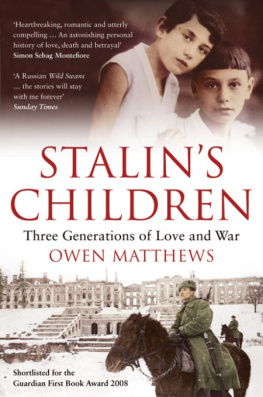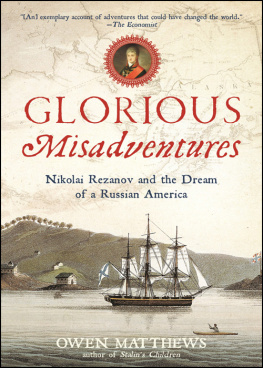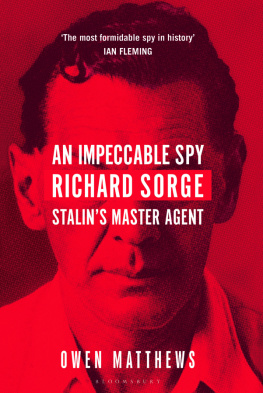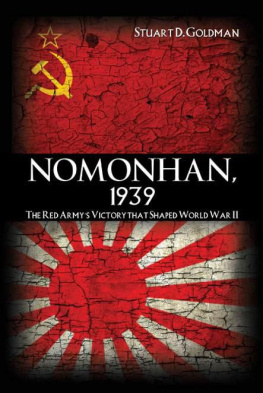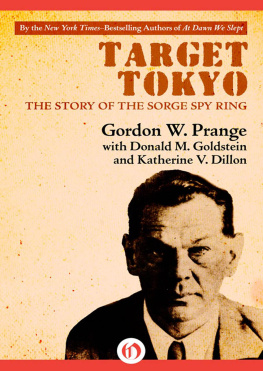
AN IMPECCABLE SPY
ALSO BY OWEN MATTHEWS
Stalins Children
Glorious Misadventures

Contents
Prologue
Siberians!
On a freezing morning in November 1941, Natalia Alexeyevna Kravchenko and her half-sister Lina buried their fathers paintings in the garden of their dacha. The artists village of Nikolina Gora, forty kilometres to the west of the Kremlin, had become the front line in the battle for Moscow. Days before, columns of smoke rising from the neighbouring village announced the arrival of the vanguard of the Wehrmacht, moving into position for their final strike on the Soviet capital. The dacha stood on a high, wooded bank of the Moscow River, and Red Army medics had commandeered it as a field hospital for the coming battle. The sisters had been told to evacuate immediately and hastily bundled their fathers paintings and pre-revolutionary silverware into a large trunk which they buried in a hollow on the steep bank that descended to the river. They held out little hope that the handful of Soviet soldiers busily digging trenches at the edge of the village could hold off the imminent German attack for long. Natalia expected that night to be the last she would ever spend at the handsome country house her father had built.
Just before dawn, Natalia was woken by a low rumbling noise. She pulled on a sheepskin coat and felt boots and went to the gate to investigate. Lying by the roadside, huddled in their army greatcoats against the cold, hundreds of Soviet soldiers were snatching a few hours sleep in the snowbanks by the side of the road. The rumble was the sound of their snoring. Siberians! an officer told her, fresh off the train from the Soviet Far East: reinforcements come to defend Moscow.
Over the following days the Siberian boys died in their hundreds in the marshy ground between the villages of Nikolina Gora and Aksinino, alongside hundreds of thousands of other Soviet troops along a 600-kilometre front around Moscow. The huge draughtsmans desk specially made for Natalias father was pressed into service as an operating table. But the Germans never advanced any further. Natalia Alexeyevna did return to the dacha; indeed, she lives there still. So does her granddaughter, who is my wife. This book was partly written there. The paintings are back on the walls. Even the pit that the girls dug in the hillside is still visible when the undergrowth dies back in autumn. The old steel trunk stands rusting behind the house.
The tide of the Second World War turned outside Moscow that month, thanks largely to those Siberian reinforcements. They might not have been there without the efforts of a German communist spy operating on the far side of the world an agent who penetrated the innermost secrets of both the Japanese and the German high command, yet was distrusted by his own spymasters in Moscow. Victory, of course, has many fathers, especially one as bloody and momentous as the Soviet victory in the Second World War. But Richard Sorges brilliant work played a crucial role in saving the Soviet Union from disaster in 1941 and enabled Stalins eventual victory in 1945.
Richard Sorge was a bad man who became a great spy indeed one of the greatest spies who ever lived. The espionage network that he built in pre-war Tokyo put him at just one degree of separation from the highest echelons of power in Germany, Japan and the Soviet Union. Sorges best friend, employer and unwitting informant Eugen Ott, German ambassador to Japan, spoke regularly to Hitler. Sorges top Japanese agent Hotsumi Ozaki was a member of the cabinets inner advisory council and regularly talked to Prime Minister Prince Konoe. And in Moscow, Sorges immediate bosses were constant visitors to Stalins Kremlin study. Sorge survived as an undetected Soviet spymaster for nearly nine years in Tokyo, even as Japan was swept by hysterical spy mania and the police constantly hunted for the source of his regular, coded radio transmissions. And yet he managed to steal the most closely kept military and political secrets of both Germany and Japan while hiding in plain sight.
Sorge was both an idealistic communist and a cynical liar. He saw himself as a soldier of the revolution, a member of an exalted class of secret party cadres entrusted with the sacred task of penetrating the citadels of the USSRs imperialist enemies. But at the same time he was a pedant, a drunk, and a womaniser. He was addicted to risk, a braggart, often wildly indisciplined. On his frequent alcoholic binges, he crashed cars and motorcycles, drunkenly confessed his love for Stalin and the Soviet Union to audiences of Nazis, and recklessly seduced the wives of his most valuable agents and closest colleagues.
Sorge often spoke of himself as a romantic hero, a robber-knight from German Romantic poetry. In truth he was one of the lonely deciders who haunt the fringes of the political desert, a man always destined to carry the burden of superior knowledge and higher motives than the lesser humans who surrounded him. A self-professed champion of the working masses, he was a raging intellectual snob whose natural milieu was the casinos, whorehouses and dance halls of pre-war Shanghai and Tokyo.
Above all he was a professional dissembler. Like most who reached greatness in his profession, Sorge was driven by a profound compulsion to deceive. Deception was both Sorges skill and his fatal addiction. For most of his life Sorge lied to all those around him his many lovers and friends, his colleagues and his masters. Perhaps he even lied to himself.
One of the most extraordinary things about the Sorge story is the realisation that he moved in a world of shifting international alliances and infinite possibility. To the nation-state players at the time, even the most cast-iron certainties of hindsight were still malleable even such apparently immutable matters as which nation would be on which side in the Second World War. For much of Richard Sorges career, the Soviet Union and Germany, while ideological opponents, were in fact covert allies. Throughout the 1920s the German Army sent thousands of troops for training on the plains of Belorussia, under the terms of a secret agreement between Moscow and Berlin. In 1939 Stalin struck a deal with Hitler to divide up Europe, from the Baltics to the Balkans via Poland. Soviet and Nazi troops, victorious against their common Polish enemy, staged joint victory parades in Brest and other occupied cities. As late as February 1941, Hitler was offering Stalin membership of the Axis powers albeit while simultaneously preparing to invade the USSR and urging that Germany, Italy, Japan and the Soviet Union divide the world between the great dictatorships of the age. Stalin, while wary, was certainly tempted. Until the night of 22 June 1941, Hitler and Stalin were allies and the latter apparently believed that he would remain so. Even more strangely, we now know as Richard Sorge did not that from September 1940 Stalin had also laid his own contingency plans for invading Germany, known as Operation Groza. Even as he sent Germany vast supplies of corn, oil and steel to fuel the Nazi war effort under the terms of the 1939 non-aggression pact with Berlin, the Soviet dictator had his own opportunistic scheme in place for double-crossing Hitler should the opportunity arise.
Japans role in the world war was even more mutable. It was clear from the moment that a group of renegade Japanese officers provoked an invasion of Chinese Manchuria in 1931 that Tokyos military had expansionist dreams in Asia ambitions that would, in time, swamp the protests of the civilian government at home. But Japans attitude to Russia was deeply ambiguous. The Japanese Army lobbied forcefully for an invasion of the Soviet Union an invasion which would have utterly destroyed Stalins efforts to fight the Germans after the Nazi invasion of Russia in 1941. The Japanese Navy was equally adamant that the nations imperial destiny lay to the south, in seizing control of the rice fields of Indochina and the oil wells of the Dutch East Indies. Thus the survival of the USSR hung on the intricate power plays inside the Imperial Japanese General Staff in 1941. Could Stalin afford to denude the Soviet Far East of troops in order to defend Moscow? It depended on knowing whether or not Japans 1941 invasion plan for the USSR was going to be put into action. And it was their master agent, Sorge, who could tell them.
Next page
